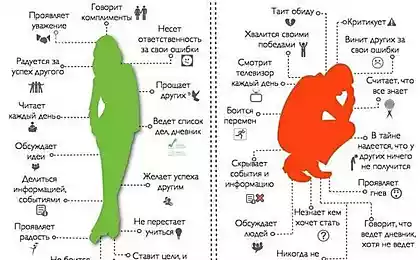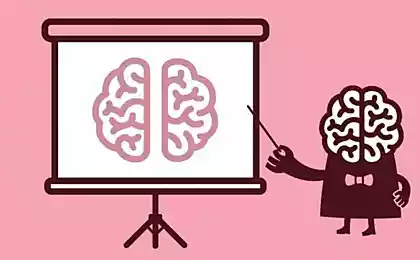1454
5 trick that the brain keeps you in the power of the hated bad habit (5 photos)
A bad habit can ruin lives. You understand that perfectly, and really want to get rid of it, but ... you do not go out. You want to know why?
And because your brain knows many tricky ways to keep you in the power of your habits.
1. Your brain thinks you are "future" a completely different personality

You know exactly what tomorrow at 8:00 you have to take an important exam. And yet, an hour of the night, and you're still staying in aimless wandering the back streets of the Internet. Mind, you, of course, realize that it's time to go to bed and tomorrow night vigil will your side, but on a subconscious level "version of tomorrow" itself seems to you a completely different person. The one tomorrow, and will deal with the consequences; and today looks even some militant.
In one scientific study found that when we think about ourselves and about other people are activated very different parts of our gray matter. It is quite clear - the brain assigns different share his beloved and all the rest, because, first of all, think about your own needs. The strange thing is that some people, when thinking about his future intensified those areas that have been reserved for the "outsiders".
Well, as you are now to motivate yourself to give up bread rolls and go to the gym? You can as much as necessary to convince yourself that soon you will not zastegnёtsya no pair of pants, but because your brain refuses to associate itself with the fat man of tomorrow, it will be manipulated by your subconscious to once again enjoy the fragrant pastries.
2. To form a stable "good" habit takes about ten weeks

Suppose you have one or two bad habits from which you should definitely get rid of. You decide to start with in order to get a few good, because, as you know, the surest way to overcome addiction - is to displace it with another addiction. You buy a ticket to a local gym and planning to train three times a week, and win, at last, a passion for pastries. Or beer. Or, more to do with anything.
What do you think, how much time you have to force yourself until exercise becomes part of your life? And as soon as the exercise will be fun?
According to one study, the formation of habits takes about 66 days. During this time, a conscious effort and forcing pass in automatism. So if you decide to make friends with a treadmill, keep in mind that only two months later, it has evolved from the usual torture session.
During these two months, all sorts of obstacles and a slingshot will stand in your way constantly. Then you catch a cold, you have to stay at work ... And everything. The end of a good habit and return to the previous "harmful" joy - because the latter has long been established and integrated into your life.
This is not because your brain wants you to evil - he just loves productivity, and bad habits are always effective. And the results he achieves this: turn your life into a set of repetitive tasks that can be done on autopilot, to develop experience-based set of rules that would allow life to live, spending a minimum of energy. All.
So if you want to break the usual course of your life, you have to be very tight. About two months.
3. Willpower - limited resource

If you still firmly decided, for example, to run every morning, and tune in to a long struggle with myself, we consider it our duty to warn you: the greatest danger on your way to perfection are not all sorts of uncontrollable your circumstances, but ... lack of motivation. That is, if you're, say, running every morning, and already boasts some success, to what point can decide that deserved respite.
It turns out more often and longer than people resist their desires, the less power they will remain for subsequent resistance desired. In psychology, this phenomenon is called "exhaustion of willpower."
During the experiment, researchers asked one group of students to remember a two-digit number, and the other - seven-digit. Then ask the participants from both groups a choice between cake and fruit salad. Surprisingly, students who memorized the seven-digit number, selected cakes are twice as likely. That is, in order to significantly reduce the strength of will, and throw in the towel just remember some five extra digits.
Then other scientists conducted an experiment in which approached the same problem from the other side: the volunteers showed two meals - one with a freshly made biscuits, and another - with radishes. Half the participants were instructed to take a pre-cookies, the other half - to take a radish. Then all were asked to solve a complex geometrical puzzle. Those that took radishes, thrown a job after eight minutes, and those who got cookies, struggled with the puzzle as much as 19 minutes.
Despite the fact that the job did not require any physical effort, giving up delicious cookie robbed members of the forces that could be spent on the job.
4. The brain uses your progress as an excuse to make yourself a favor

For one recent study, researchers gathered a group of dieters and has already achieved considerable success people. Volunteers were divided into two groups. Some began to praise for their achievements towards his ideal, the other did not say anything special.
After that, both groups offered a choice between an apple and a chocolate bar as a thank-you gift for participating in the study. 85 percent of those who praised chose the chocolate, in the second group of preferred chocolate only 58 percent of participants.
Those who sang the praises, have decided that they have every right once reward yourself for successes, while others humbly munching apples.
In other words, the realization of success - the first step to failure.
If the "celebration" was limited to only one bar of chocolate, this would not be a huge disaster. But ... ask any man to get out of whatever it was based, and he confirmed that "once" almost always turns into a torrent of small lesions, and you do not have time to look around, on your success does not remain a trace.
As we have said, the brain prefers the old, familiar, and therefore less energy-intensive way of life, even if you run the risk of him not live to forty.
But sometimes ...
5. Are you reconciled with a bad habit to protect yourself from a big failure

There is a special type of people who always whine. On their road to success is always some insuperable barrier - no, the other way. After talking with a man for a long time, you know - he does not seek to achieve something, just all the time inventing itself more and more obstacles - and, apparently deliberately.
This phenomenon psychologists call "masochistic personality disorder". Scientists explain this behavior as follows: a person unconsciously "agrees" to failure, which can be relatively easy to survive, because it is afraid of the other, some very painful. That is committing a kind of deal.
For example, a single man more completely refuses to communicate with the girls, and will endure the ridicule than allow some beauty to reject him as a botanist / mattress / pimply nerd.
And then - very easy to see how this grows another bad habit. For example, office work for you is complicated by the fact that you hate wearing ties or wake up in the morning. In this case, you have a very good motivation to cherish in themselves these weaknesses, because they protect you from the shame to be incompetent and fail in their professional activities. So you continue to wander around, but the illusion of their own professional genius, which always prove anything, but prevents. Thumbsucker is the guardian of your self-esteem.
And while your conscious "I" hates himself for his weakness, unconscious "I" secretly sabotages any your attempt to deal with them, because he is your self-improvement to anything, self-indulgence - that's his only tsel.Istochnik:
And because your brain knows many tricky ways to keep you in the power of your habits.
1. Your brain thinks you are "future" a completely different personality

You know exactly what tomorrow at 8:00 you have to take an important exam. And yet, an hour of the night, and you're still staying in aimless wandering the back streets of the Internet. Mind, you, of course, realize that it's time to go to bed and tomorrow night vigil will your side, but on a subconscious level "version of tomorrow" itself seems to you a completely different person. The one tomorrow, and will deal with the consequences; and today looks even some militant.
In one scientific study found that when we think about ourselves and about other people are activated very different parts of our gray matter. It is quite clear - the brain assigns different share his beloved and all the rest, because, first of all, think about your own needs. The strange thing is that some people, when thinking about his future intensified those areas that have been reserved for the "outsiders".
Well, as you are now to motivate yourself to give up bread rolls and go to the gym? You can as much as necessary to convince yourself that soon you will not zastegnёtsya no pair of pants, but because your brain refuses to associate itself with the fat man of tomorrow, it will be manipulated by your subconscious to once again enjoy the fragrant pastries.
2. To form a stable "good" habit takes about ten weeks

Suppose you have one or two bad habits from which you should definitely get rid of. You decide to start with in order to get a few good, because, as you know, the surest way to overcome addiction - is to displace it with another addiction. You buy a ticket to a local gym and planning to train three times a week, and win, at last, a passion for pastries. Or beer. Or, more to do with anything.
What do you think, how much time you have to force yourself until exercise becomes part of your life? And as soon as the exercise will be fun?
According to one study, the formation of habits takes about 66 days. During this time, a conscious effort and forcing pass in automatism. So if you decide to make friends with a treadmill, keep in mind that only two months later, it has evolved from the usual torture session.
During these two months, all sorts of obstacles and a slingshot will stand in your way constantly. Then you catch a cold, you have to stay at work ... And everything. The end of a good habit and return to the previous "harmful" joy - because the latter has long been established and integrated into your life.
This is not because your brain wants you to evil - he just loves productivity, and bad habits are always effective. And the results he achieves this: turn your life into a set of repetitive tasks that can be done on autopilot, to develop experience-based set of rules that would allow life to live, spending a minimum of energy. All.
So if you want to break the usual course of your life, you have to be very tight. About two months.
3. Willpower - limited resource

If you still firmly decided, for example, to run every morning, and tune in to a long struggle with myself, we consider it our duty to warn you: the greatest danger on your way to perfection are not all sorts of uncontrollable your circumstances, but ... lack of motivation. That is, if you're, say, running every morning, and already boasts some success, to what point can decide that deserved respite.
It turns out more often and longer than people resist their desires, the less power they will remain for subsequent resistance desired. In psychology, this phenomenon is called "exhaustion of willpower."
During the experiment, researchers asked one group of students to remember a two-digit number, and the other - seven-digit. Then ask the participants from both groups a choice between cake and fruit salad. Surprisingly, students who memorized the seven-digit number, selected cakes are twice as likely. That is, in order to significantly reduce the strength of will, and throw in the towel just remember some five extra digits.
Then other scientists conducted an experiment in which approached the same problem from the other side: the volunteers showed two meals - one with a freshly made biscuits, and another - with radishes. Half the participants were instructed to take a pre-cookies, the other half - to take a radish. Then all were asked to solve a complex geometrical puzzle. Those that took radishes, thrown a job after eight minutes, and those who got cookies, struggled with the puzzle as much as 19 minutes.
Despite the fact that the job did not require any physical effort, giving up delicious cookie robbed members of the forces that could be spent on the job.
4. The brain uses your progress as an excuse to make yourself a favor

For one recent study, researchers gathered a group of dieters and has already achieved considerable success people. Volunteers were divided into two groups. Some began to praise for their achievements towards his ideal, the other did not say anything special.
After that, both groups offered a choice between an apple and a chocolate bar as a thank-you gift for participating in the study. 85 percent of those who praised chose the chocolate, in the second group of preferred chocolate only 58 percent of participants.
Those who sang the praises, have decided that they have every right once reward yourself for successes, while others humbly munching apples.
In other words, the realization of success - the first step to failure.
If the "celebration" was limited to only one bar of chocolate, this would not be a huge disaster. But ... ask any man to get out of whatever it was based, and he confirmed that "once" almost always turns into a torrent of small lesions, and you do not have time to look around, on your success does not remain a trace.
As we have said, the brain prefers the old, familiar, and therefore less energy-intensive way of life, even if you run the risk of him not live to forty.
But sometimes ...
5. Are you reconciled with a bad habit to protect yourself from a big failure

There is a special type of people who always whine. On their road to success is always some insuperable barrier - no, the other way. After talking with a man for a long time, you know - he does not seek to achieve something, just all the time inventing itself more and more obstacles - and, apparently deliberately.
This phenomenon psychologists call "masochistic personality disorder". Scientists explain this behavior as follows: a person unconsciously "agrees" to failure, which can be relatively easy to survive, because it is afraid of the other, some very painful. That is committing a kind of deal.
For example, a single man more completely refuses to communicate with the girls, and will endure the ridicule than allow some beauty to reject him as a botanist / mattress / pimply nerd.
And then - very easy to see how this grows another bad habit. For example, office work for you is complicated by the fact that you hate wearing ties or wake up in the morning. In this case, you have a very good motivation to cherish in themselves these weaknesses, because they protect you from the shame to be incompetent and fail in their professional activities. So you continue to wander around, but the illusion of their own professional genius, which always prove anything, but prevents. Thumbsucker is the guardian of your self-esteem.
And while your conscious "I" hates himself for his weakness, unconscious "I" secretly sabotages any your attempt to deal with them, because he is your self-improvement to anything, self-indulgence - that's his only tsel.Istochnik:
9 little-known spices from around the world (9 photos)
Ten interesting facts about kinship surrounding flora and fauna (10 photos)























